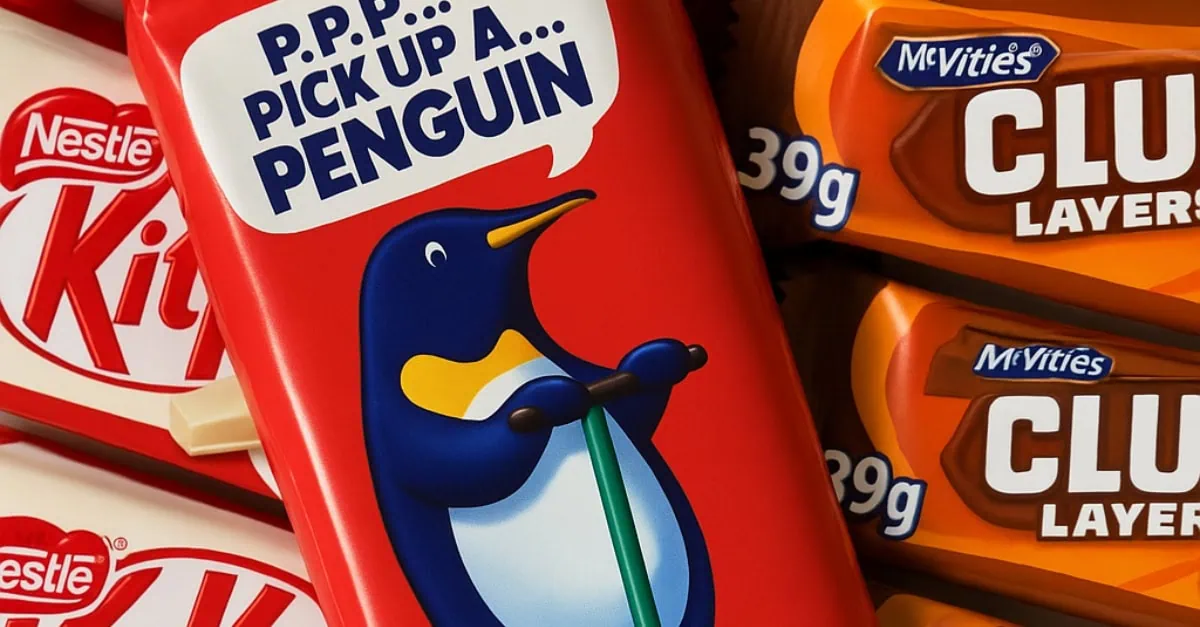High cocoa prices are driving recipe changes across the chocolate industry, with companies replacing traditional cocoa with alternative ingredients and some brands losing their classification as chocolate.
McVitie’s Penguin and Club bars, along with KitKat White and McVitie’s White Digestives, can no longer be marketed as chocolate because they do not contain enough cocoa. The products now feature “chocolate flavour” coatings instead.
The biscuits can no longer be classified as chocolate because they now contain more palm and shea oils than cocoa. The classic treats quietly changed their recipe earlier this year as ingredient costs rose and manufacturers looked for cheaper ways to keep them on the shelves.
Rice-based chocolate development
UK company Win-Win is using fermented rice to create cocoa-free chocolate. The process mirrors conventional chocolate-making, involving steps such as fermentation and roasting. The company combines the fermented base with other ingredients including carob, fats and sugars, and uses conventional chocolate-making processes.
“If you’re a company using chocolate today, you’re in crisis. Prices have more than quadrupled in three years. For some small businesses, that can be the difference between surviving or not,” said Mark Golder, chief executive of Win-Win. “There’s been an explosion in interest over the last 18 months. We’re getting inbound inquiries all the time from customers across Europe and further afield.”
Germany’s Planet A Foods uses oats and sunflower seeds that are roasted and fermented to recreate the taste and texture of chocolate without any cocoa. The company says its process produces up to 90% less carbon emissions and uses 90% less water than conventional chocolate. Planet A has partnered with major food producers, including Aldi and Lidl, and has scaled up production to more than 10,000 metric tonnes a year as demand grows across Europe.
In the US, California startup Voyage Foods has developed a product made from grape seeds, sunflower protein and shea butter. Voyage Foods has raised over USD 40 million in investment to scale its operations and supply manufacturers.
Industry investment in alternatives
Cargill has noted an uptick in interest in chocolate alternatives, said John Satumba, the company’s director of global edible oil solutions research and development. Cargill has invested USD 35 million in a facility in the Netherlands that makes coatings and fillings using less cocoa and is building a facility in Ohio to manufacture chocolate substitutes. Globally, the company has invested USD 70 million in cocoa butter equivalent capabilities.
To manage costs, chocolate makers are also tweaking recipes by using less cocoa or incorporating cheaper ingredients like caramel and nuts.
Health considerations
Prof Tim Spector, co-founder of UK-based health and nutrition company Zoe, said chocolate alternatives made without cocoa form part of a wider emerging field of food innovation that’s better for the planet. However, he added that when it comes to nutrition, a new process doesn’t automatically translate into a healthier product.
“Minimally processed cocoa is rich in bioactive compounds such as flavanols that are very good for our gut health, blood pressure, and heart health,” Spector said. “At the moment we don’t know whether these new ‘chocolate-like’ creations will have the same beneficial health impact.”
Dark chocolate and raw cacao powder are genuinely healthy foods to include in your diet, Spector added, but he cautioned that consumers should be careful of thinking that cocoa-free or lab-grown automatically means better in every sense.
Price pressures for consumers
Halloween candy prices reflected the cost pressures. A 100-count bag of Halloween candy that cost about USD 9 five years ago now costs around USD 16, according to FinanceBuzz, an increase of more than triple the rate of inflation.
The price of chocolate for shoppers climbed 15.4% in the year to August. In Canada, confectionery items like chocolate went up in price by 10.4% in September compared to the same period last year.
Experts say high cocoa prices have triggered a wave of reformulations, the industry term for recipe changes. As the Halloween season boosts demand, some candy companies are replacing expensive cocoa butter with other fats, a swap that means their products no longer meet the US regulatory definition of milk chocolate and can no longer be called that on packaging.
This newsarticle is part of a more comprehensive cocoa market analysis. For the full analysis, visit: https://app.vespertool.com/market-analysis/2415
